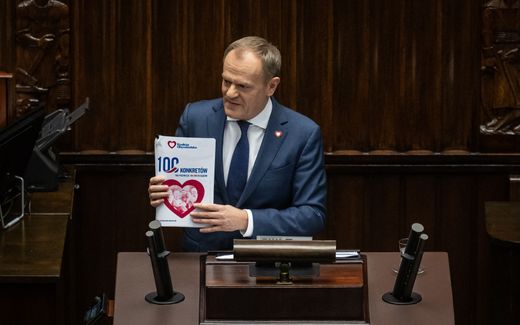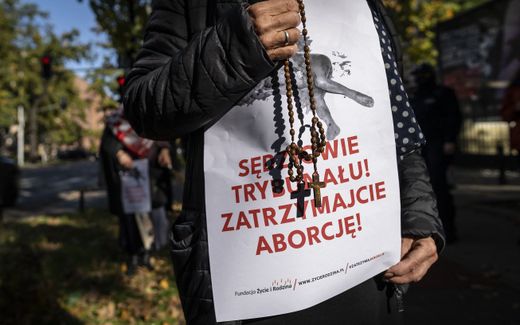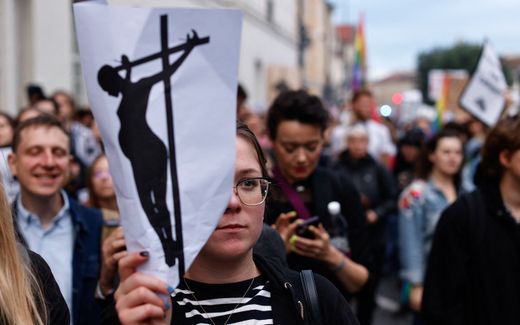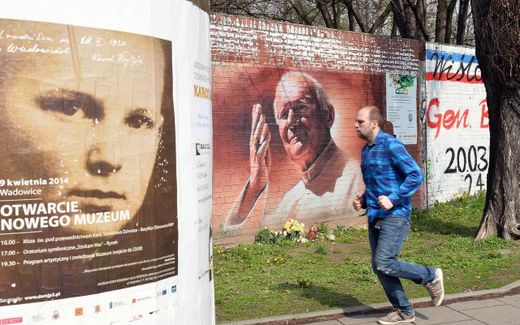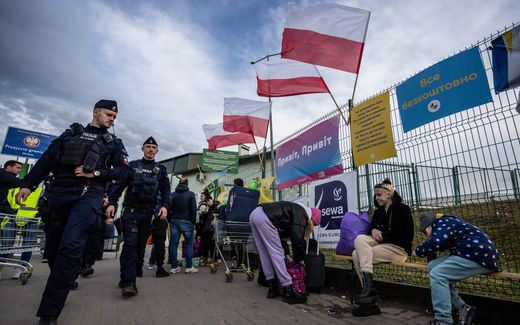How the Polish government fails to change the abortion law
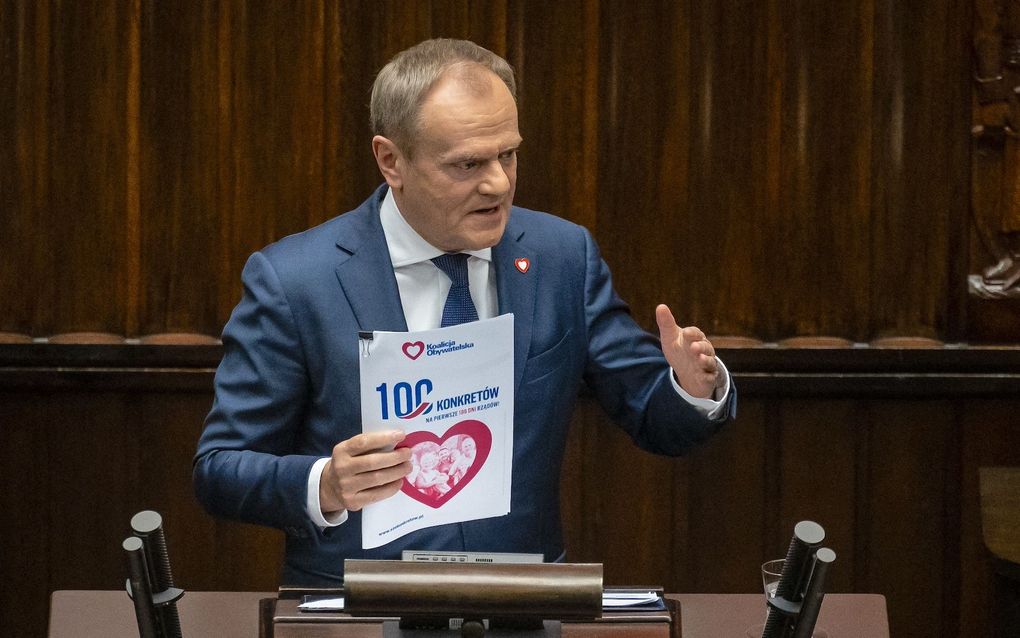
Tusk in the Polish Parliament. Photo AFP, Wojtek Radwanski
Central Europe
In the election campaign, Donald Tusk promised to liberalise the abortion law in Poland. But now he is prime minister; he realises that his coalition does not have enough votes for this. Now, he plans to ease the regulations in the hospitals.
In 2020, Poland's court issued a landmark ruling on the nation's abortion ban.
The nation's Constitutional Tribunal determined that abortion should be illegal in cases of severe foetal defects. At the time, only a few exceptions existed in the overall ban. Now that the right-leaning Law and Justice party is no longer a majority, that may soon change.
Donald Tusk's ruling party now wants to see all restrictions go by, starting with the hospitals, according to Notes from Poland report. Recently, his pro-abortion vision has come in the form of releasing new guidelines for the healthcare sector on "when and how" to get a legal termination.
However, Tusk's move toward full legalisation has been met with opposition from more conservative parties. One of Tusk's campaign promises has been to allow abortions up to twelve weeks, according to a Euronews report. That vision has proven impossible, as he admitted at the end of August that any amendments would be unlikely in his term. Tusk's party will be up for election in 2027.
"There will be no majority in this parliament for legal abortion, in the full sense of the word, until the next elections. Let's not kid ourselves," Tusk said.
Despite a lack of necessary votes, he remains determined to push for greater "liberalisation" and has said that if "we can't change the law, we will change reality."
Tusk is changing the current reality by working with prosecutors and hospitals to create new procedures. Some reports have suggested that the current laws make it almost impossible for a woman to obtain an abortion in Poland. It is also considered a crime in Polish law to offer assistance in an abortion, such as giving out abortifacient drugs. One activist was convicted of giving a woman pills for her termination.
"I can only promise that within the framework of the existing law, we will do everything to make women suffer less, to make abortion as safe as possible and accessible when a woman has to make such a decision. So that people who get involved in helping a woman are not prosecuted," he said to Euronews.
But even the new guidelines for hospitals have come under criticism by Natalia Broniarczyk, who works for the abortion assistance NGO Abortion Dream Team. Broniarczyk argues in Reporting Democracy that the guidelines are "repeating what is already in Polish law and that "Tusk is just spelling out the famous abortion compromise of 1993." Yet, she said that many doctors in Poland are not adequately informed about the current procedures. When they decide to conduct an abortion, a curettage is often preferred over the medication route. Pills have proven to be safer, Broniarczyk added.
Malta
Abortion has increasingly become a heated topic within the country. Poland and Malta have some of the toughest restrictions on the practice, with few exceptions. Before 2020, Notes From Poland mentioned that abortion was allowed in cases when the mother's life or health is in danger, after a crime such as rape or incest, and when the foetus has severe birth defects.
After 2021, abortion rights activists have tried to revoke the Polish court's ruling in their fight for legalisation. According to WorldCrunch, foetal defects accounted for at least one-third of all abortions in 2020. After the law was introduced in 2021, abortions in the country decreased significantly. Only 107 were performed in 2021, compared to over 1,000 in 2020.
In 2023, the number increased again to 423, according to Notes From Poland. Some abortion activists have pointed out that even when a woman is eligible for an abortion, she can still face legal consequences. A woman who would only identify herself as "Joanna" said that she was forced to strip down in front of police after taking abortifacient drugs, according to the Worldcrunch report.
She had been experiencing health problems and felt that she needed to take them. Despite her arrest by police, taking abortifacient drugs is not considered illegal in Poland. In another case, a 33-year-old woman from a town in southern Poland died after a hospital denied an abortion in her pregnancy. According to Worldcrunch, if the hospital performed the abortion, it would have likely saved her life.
Bishops
Despite contradictory actions in Poland's abortion law, the practice remains largely opposed by the nation's Catholic church. The Polish Bishops’ Conferences panel of bioethics experts said to Die Tagespost that they were “closely following the situation in the government’s attempts “liberalise the practice of killing unborn children.”
They also found the government's proposals a threat to one's freedom of conscience if a medical professional refuses to perform an abortion for any reason. What's more, the experts also found it shocking that liberalising the abortion law would mean a ban on consultations before a termination. The bishops concluded their six-point statement by upholding the church's procedure of excommunication in cases when there is "the killing of an unborn child and participation of such practice."
"Direct abortion, that is, voluntary abortion as an end or as a means, always represents a serious moral disorder since it is the deliberate killing of an innocent human being," the statement said.
Protestants
While the Catholic Church has been vocal in its opposition, many Protestants have either remained silent or have voiced their support for abortion, according to Kasia Nowak, who is an Evangelical Protestant and a freelance English teacher in Poland.
"Many Evangelicals chose this government. The Catholics are the ones that are against this government and abortion. If I support Catholic organisations, I go against my beliefs," she said.
Nowak also said there is an "invisible roadblock" on right-leaning issues. Opposing abortion is considered a Catholic decision in Poland. In the US, going against the practice is considered more Protestant.
"I would gladly move to the US because of the situation here. I think I can identify more with American Evangelicals," she said.
While Tusk's actions continue to keep the abortion debate alive, some are staying out of the talk by helping women in their pregnancies. The non-profit organisation, Dwie Kreski, which is aimed toward assisting women in crisis pregnancy situations, said that they want to remain politically and religiously neutral. In Polish, Dwie Kreski means two lines, as in the two solid lines in a positive pregnancy test.
Anna Krasuska, who works at the organisation, said supporting women in their decisions and helping them think about the best possible solutions are important. While their volunteers and helpline do not encourage abortion nor provide assistance in getting one, they present an alternative: What would you need not to want to have an abortion?
While contemplating a termination, she said many women think no other option is available. What's more, some women are convinced they will be alone if they choose to have the baby.
"When she has an abortion, she is often alone too. Many people are not aware that several negative emotions are present," Krasuska said about both pregnancy and termination.
Although the organisation tries to suggest different solutions which could be alternatives to abortion, it is important never to force the woman to a certain course of action. The organisation uses the Polish term Podopieczna whenever a woman seeks their help. It means someone who is guided or supported by someone.
"One of the most important things is being a companion for these women- being there, supporting, helping, and talking to women in their time of need," she said.
Related Articles


